Global Security and International Affairs
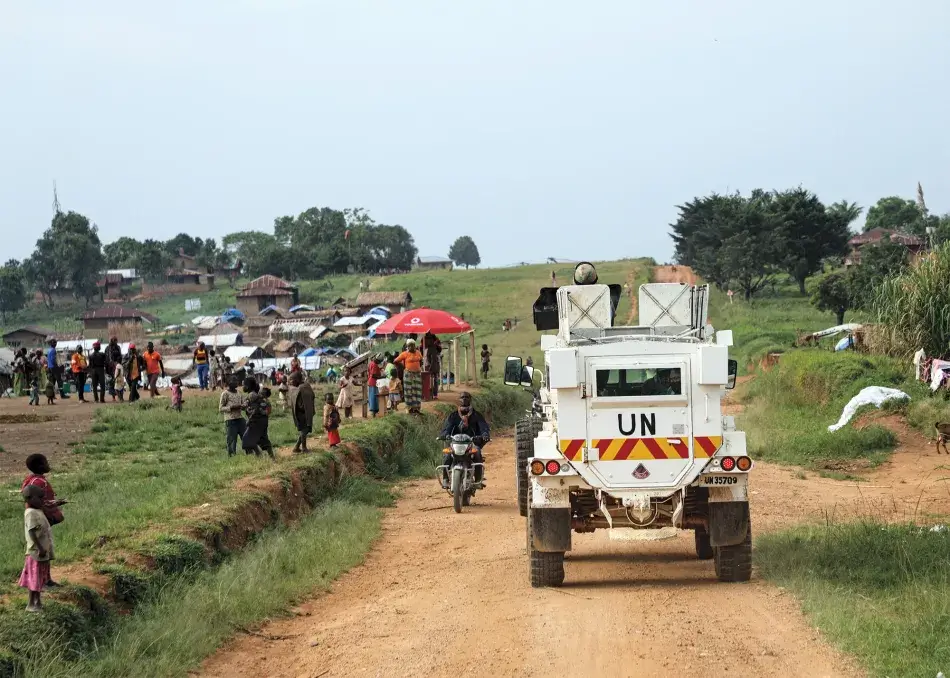
The Global Security and International Affairs program area draws on the expertise of policy-makers, practitioners, and scholars to foster knowledge and inform innovative and more substantial policies to address crucial issues affecting the global community. Projects underway in this area engage with pressing strategic, development, and moral questions that underpin relations among people, communities, and states worldwide. Each initiative embraces a broad conception of security as the interaction among human, national, and global security imperatives. Project recommendations move beyond the idea of security as the absence of war toward higher aspirations of collective peace, development, and justice.
Committee on International Security Studies
CHAIR
Scott D. Sagan
Stanford University
MEMBERS
Antonia Chayes
Tufts University
Christopher F. Chyba
Princeton University
Neta C. Crawford
Boston University
Karl W. Eikenberry
Schwarzman College
Tanisha M. Fazal
University of Minnesota
Martha Finnemore
George Washington University
Lawrence D. Freedman
King’s College London
Susan Landau
Tufts University
Robert Legvold
Columbia University
Rose M. McDermott
Brown University
Steven E. Miller
Harvard Kennedy School
Barry R. Posen
Massachusetts Institute of Technology
Adam Roberts
British Academy
Jennifer M. Welsh
McGill University
Paul H. Wise
Stanford University
Project
Rethinking the Humanitarian Health Response to Violent Conflict
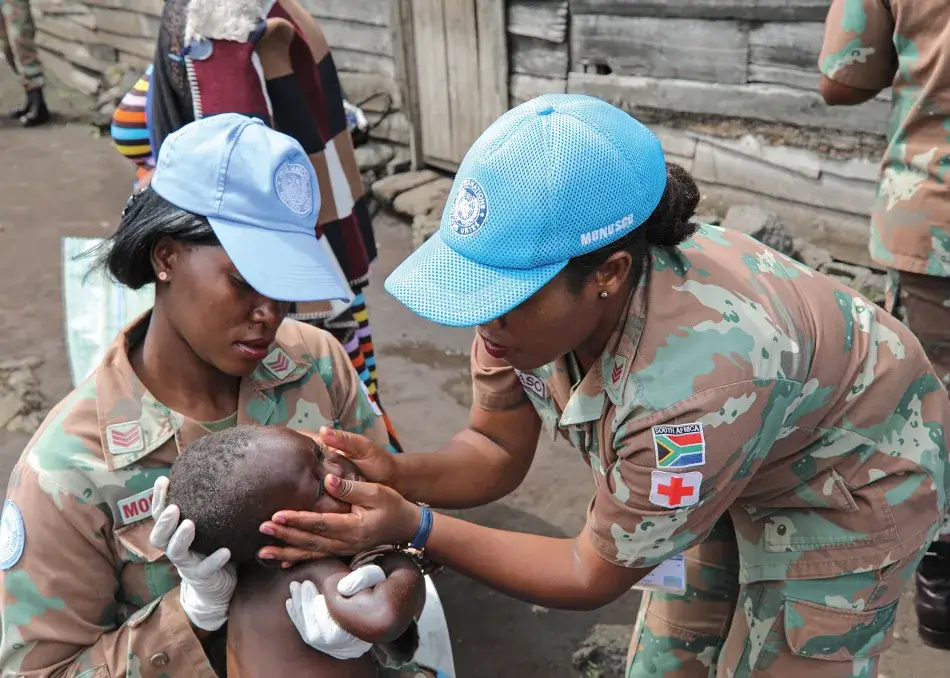
The Rethinking the Humanitarian Health Response to Violent Conflict project seeks to understand and address current trends in humanitarian contexts that pose new or evolving challenges for humanitarian health responders. Among the most pressing challenges are the increasingly protracted nature of civil and non-international armed conflict; the fact that many of the world’s most violent places are facing criminal or political violence rather than conflict as conventionally understood; shortfalls in funding; and changing geopolitical relations. This project brings together political scientists, legal and security experts, health professionals, and humanitarians to examine current challenges to effective humanitarian action and to develop, where necessary, new strategies for preventing civilian harm and delivering critical health services in areas plagued by violent conflict.
The project’s current work includes a focus on responding to some of the urgent challenges posed by the COVID-19 pandemic’s effects on humanitarian health needs in conflict areas and other violent settings. Building on its efforts to address the political and security dimensions of pandemic response in areas of weak governance and violent conflict, the initiative recently published two research papers as part of a workstream on global cooperation and pandemic control. Drawing upon the Academy’s strengths in political science, diplomacy, global health, and the arts, the project is exploring how political legitimacy, trust in expert authority and information, divisive political environments, and cultural mechanisms of community protection and social cohesion shape the ability of states and international institutions to respond to infectious outbreaks.
Another area of work, exploring Regional Humanitarian Responses to Pandemics, Criminal and Political Violence, and Forced Migration, is publishing a series of peer-reviewed journal articles that present the findings of field research conducted in partnership with the University of California, San Diego, and El Colegio de la Frontera Norte. This work focuses on understanding the impacts of COVID-19 on migrants at the U.S.-Mexico border.
Current work across the project’s major components includes substantive engagement with a range of audiences through convenings, publications, and multimedia products. A cross-cutting Dædalus volume, to be published in Spring 2023, will synthesize these findings from across all components of the project, with tailored resources prepared for select audiences, including policy-makers and practitioners.
Project Chairs
Jaime Sepúlveda
University of California, San Francisco
Jennifer M. Welsh
McGill University
Paul H. Wise
Stanford University
ADVISORY GROUP
Sergio Aguayo
El Colegio de México
Donald M. Berwick
Institute of Healthcare Improvement
Louise Henry Bryson
Public Media Group of Southern California
Rita Dayoub
Chatham House
Elisabeth Decrey Warner
Geneva Call
David P. Fidler
Council on Foreign Relations
Fouad Fouad
American University of Beirut
Marion Jacobs
University of Cape Town
Arthur Kleinman
Harvard University
Joanne Liu
McGill University
Deborah F. Rutter
John F. Kennedy Center for the Performing Arts
Tamara Taraciuk Broner
Human Rights Watch
PROJECT STAFF
Melissa Chan
Program Coordinator
Kathryn Moffat
Senior Program Officer
Tania Munz
Chief Program Officer
Islam Qasem
Program Director
Kathleen Torgesen
Program Coordinator
FUNDERS
Louise Henry Bryson and John E. Bryson
Malcolm Hewitt Wiener Foundation
Project Publications
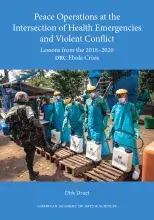
Peace Operations at the Intersection of Health Emergencies and Violent Conflict: Lessons from the 2018–2020 DRC Ebola Crisis, Dirk Druet (American Academy of Arts and Sciences, 2022)
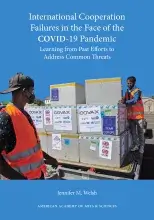
International Cooperation Failures in the Face of the COVID-19 Pandemic: Learning from Past Efforts to Address Common Threats, Jennifer M. Welsh (American Academy of Arts and Sciences, 2022)
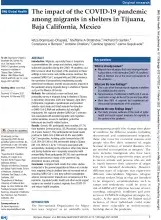
Ietza Bojorquez-Chapela, Seffanie A. Strathdee, Richard S. Garfein, et al., “The Impact of the COVID-19 Pandemic Among Migrants in Shelters in Tijuana, Baja California, Mexico,” BMJ Global Health (2022)
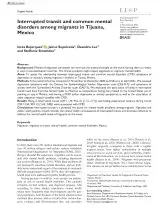
Ietza Bojorquez, Jaime Sepúlveda, Deandra Lee, and Steffanie Strandee, “Interrupted Transit and Common Mental Disorders among Migrants in Tijuana, Mexico,” International Journal of Social Psychiatry (2022).
Project Meetings
Pandemics, Peace Operations, and Public Health Responses
October 21, 2021
This workshop brought together leaders from various organizations involved in the international response to the 2018–2020 Ebola outbreak in the Democratic Republic of the Congo to discuss what can be learned from this case to improve future responses to epidemics in conflict settings. Participants offered feedback on a draft of Peace Operations at the Intersection of Health Emergencies and Violent Conflict: Lessons from the 2018–2020 DRC Ebola Crisis to ensure the relevance of the recommendations for policy-maker and practitioner audiences. The participants also explored the challenges arising from the intersection of conflict dynamics and public health emergencies and identified the implications for integrated missions operating in such contexts.
Improving the Governance of Pandemic Preparedness and Response: Lessons from Studies of International Cooperation and Institutional Design
November 15, 2021
In advance of the publication of International Cooperation Failures in the Face of the COVID-19 Pandemic: Learning from Past Efforts to Address Common Threats, the Academy cohosted an event with The Permanent Mission of Canada to the World Trade Organization, the United Nations, and the Conference on Disarmament in Geneva. Author and project cochair Jennifer M. Welsh shared key findings from the draft publication with Geneva-based diplomats prior to a Special Session of the World Health Assembly.
Workshop on the Protection of Healthcare
November 23, 2021
This workshop brought together humanitarian practitioners and scholars to assess two draft essays focused on issues related to the protection of humanitarian health responses in conflict settings. Both essays will be included in the forthcoming Dædalus volume being produced as part of the project.
Workshop on Humanitarian Health Delivery in Areas of Political and Criminal Violence
March 21, 2022
Participants in this workshop reviewed an essay that assesses the challenges that humanitarian organizations face when operating in areas with high levels of political and criminal violence, rather than in war zones. The essay, to be published in the upcoming Dædalus volume, provides policy recommendations to help facilitate the effectiveness of humanitarian health delivery in these settings.
Workshop on Understanding 21st Century Violent Conflict’s Effects on Humanitarian Health
March 24, 2022
During this workshop, the discussants provided feedback on two essays in the forthcoming Dædalus volume on Rethinking the Humanitarian Health Response to Violent Conflict. The discussion explored the humanitarian health responses in urban conflict zones and identified contemporary armed conflict’s effects on humanitarian needs, responses, and outcomes.
Discussion on Peace Operations, Public Health Emergencies, and Violent Conflict
June 7, 2022
At a meeting convened by the Academy and the United Nations Department of Peace Operations on managing peace operations in complex emergencies, such as in situations in which violent conflict and pandemics overlap, author Dirk Druet presented his paper, Peace Operations at the Intersection of Health Emergencies and Violent Conflict: Lessons from the 2018–2020 DRC Ebola Crisis. The participants included UN officials involved in the 2018–2020 response to the Ebola outbreak as well as staff from several UN agencies and UN staff in the field.
Project
Promoting Dialogue on Arms Control and Disarmament

Unlike the Cold War, the current nuclear age is characterized by a simultaneous collapse of arms control agreements and the absence of any strategic dialogue among the three main nuclear players. One strand of work in the Promoting Dialogue on Arms Control and Disarmament project consists of a series of Track-2 dialogues between experts and former policy-makers from the United States, Russia, and China, which is designed to identify critical short-term goals in arms control that would serve to minimize and reduce the potential risks of nuclear arms-racing and escalation. The meetings identify areas for cooperation and promote conceptual thinking about measures that might strengthen strategic stability and help to reduce the significant dangers of nuclear weapons being used in the future.
A second strand of work builds on the Academy’s prior experience organizing educational sessions for the U.S. Congress on a range of topics. Through a series of engagements with members of Congress and their staffs, the project will help to foster and strengthen knowledge on key issues and challenges facing the United States in arms control and international security, with particular attention to careful management of the strategic competition posed by China and Russia.
A third strand of work weaves the project’s expert discussions and policy recommendations together to produce high-impact publications on critical debates within nuclear arms control. These publications will be translated into Russian and Chinese for dissemination to policy-makers and the arms control communities in Moscow and Beijing.
PROJECT CHAIR
Steven E. Miller
Harvard University
PROJECT STAFF
Melissa Chan
Program Coordinator
Poul Erik Christiansen
Raymond Frankel Nuclear Security Policy Fellow
Kathryn Moffat
Senior Program Officer
Tania Munz
Chief Program Officer
Islam Qasem
Program Director
FUNDER
The Raymond Frankel Foundation
Project Publication
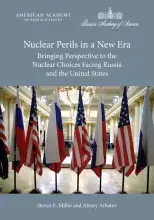
Nuclear Perils in a New Era: Bringing Perspective to the Nuclear Choices Facing Russia and the United States, Steven E. Miller and Alexey Arbatov (American Academy of Arts and Sciences and Russian Academy of Sciences, 2021)
Project Meetings
Congressional Seminar on Russia, Ukraine, and European Security
March 3, 2022
This virtual briefing for congressional staff featured presentations by Olga Oliker (International Crisis Group) and Brigadier General (ret.) Kevin Ryan (Harvard University; formerly, U.S. Army). The seminar, chaired by Steven E. Miller (Harvard University), provided an analysis of the Russian invasion of Ukraine, as well as context for the unfolding situation and an assessment of the implications for U.S. policy toward European security.
Congressional Seminar: China’s Geopolitical Balancing Act?
April 28, 2022
This congressional briefing focused on how China will seek to define its geostrategic role in light of the war in Ukraine. Chaired by Steven E. Miller (Harvard University), the virtual event featured presentations by China experts M. Taylor Fravel (MIT) and Fiona Cunningham (University of Pennsylvania) on Chinese actions and policies toward both Russia and the United States and what this may mean for U.S. policy, with particular attention to nuclear arms control.
Nuclear Arms Control and International Security: Challenges and Opportunities for U.S. Policy
June 9, 2022
The participants at this in-person workshop included congressional staff working on international security and nuclear arms control. The sessions featured presentations by leading experts and provided an opportunity for discussion of legislative action.
Project
Meeting the Challenges of the New Nuclear Age, Phase I
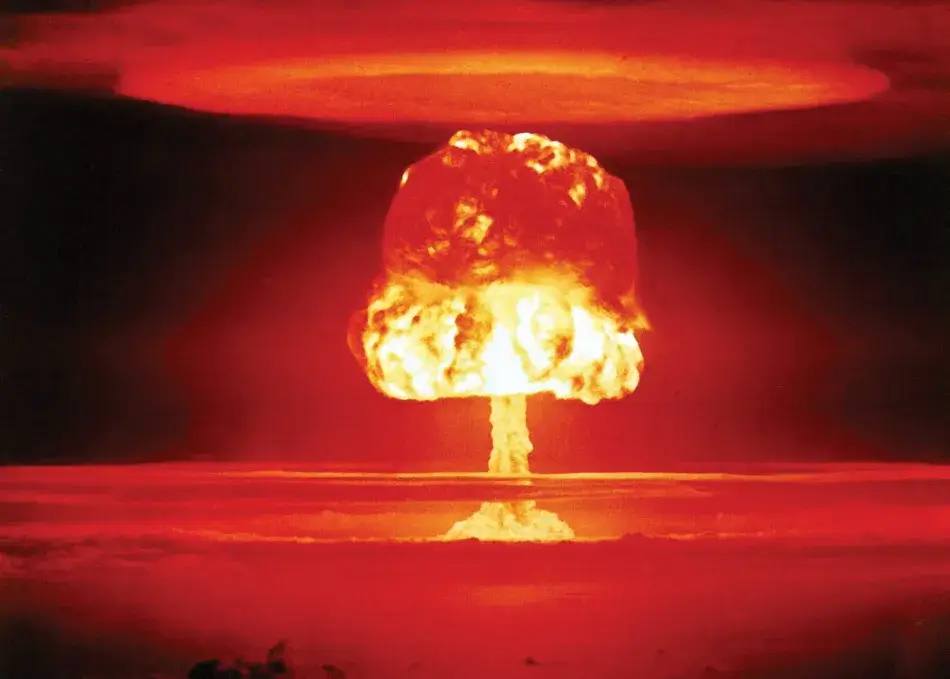
The world has entered a new nuclear era. No longer dominated by two nuclear superpowers, the evolving multipolar nuclear order presents fundamental challenges to the conceptual and practical means of avoiding nuclear war. Moreover, the new era has slowly dismantled the bilateral arms control framework, with no clear prospect that it will be revived and extended. The possibility that a framework or frameworks encompassing other, let alone all, nuclear powers can be achieved seems even more remote. In addition, advances in weapons technology and the opening of new frontiers, such as cyber capabilities and artificial intelligence, make a shifting environment still more complex. The pathways to inadvertent nuclear war have multiplied across more regions and relationships.
Since 2017, the Meeting the Challenges of the New Nuclear Age project has worked to identify the major dangers generated by the dynamics of a multipolar nuclear world that pose the greatest threat of inadvertent nuclear war; offer alternative approaches to addressing each of these dangers; facilitate discussions with relevant communities in the United States and abroad; and encourage and assist policy-makers, Congress, the analytical community, and the media to think systematically about our increasingly multipolar world. The publications produced by the project have been shared widely with domestic and international policy-makers, scholars and students of nuclear affairs, and leaders of international organizations.
The Meeting the Challenges of the New Nuclear Age project is rooted in the critically important work on arms control that the Academy conducted from 1958 to 1960 to prevent a nuclear confrontation between the United States and the Soviet Union. During that time, Academy Fellows gathered monthly to build a cooperative framework between the United States and the Soviet Union based on the limitations of the nuclear stockpile and the establishment of mutual vulnerability between the two rivals. The group included Donald Brennan, Edward Teller, Henry Kissinger, and Thomas Schelling, among others. Today, more than ever, an effort that brings together scholars and policy-makers to examine the wide range of challenges posed by the changing nuclear order is urgently needed. More information about the Academy’s nuclear-related projects is online at www.amacad.org/nuclear.
Project
Meeting the Challenges of the New Nuclear Age, Phase II: Deterrence & New Nuclear States

With the emergence of three new nuclear powers (India, Pakistan, and North Korea) and several potential future nuclear states (including Iran, Saudi Arabia, and Turkey), the world is on the verge of a new nuclear age. This will demand new thinking about the security implications of nuclear powers that may be in highly hostile environments, suffer from domestic instability, have fewer resources, or be led by personalist dictators. Phase Two of Meeting the Challenges of the New Nuclear Age investigates the deterrence and defense implications facing small nuclear force countries and potential proliferators.
The project is producing an edited volume of innovative, policy-relevant essays that will be published by Cornell University Press. Outreach activities will be aimed at nuclear policy-makers (primarily in the United States) and academic centers and think tanks with a nuclear studies focus.
Project Chairs, Phase I
Robert Legvold
Columbia University
Christopher Chyba
Princeton University
Project Chairs, Phase II
Scott D. Sagan
Stanford University
Vipin Narang
Massachusetts Institute of Technology
Steering Committee Members, Phase I
Thomas J. Christensen
Princeton University
Lynn Eden
Stanford University
Steven E. Miller
Harvard University
Janne Nolan †
George Washington University
Scott D. Sagan
Stanford University
Jon Wolfsthal
Nuclear Crisis Group
Working Group Members, Phase I
James M. Acton
Carnegie Endowment for International Peace
Mark Bell
University of Minnesota
Linton Brooks
Center for Strategic and International Studies
M. Taylor Fravel
Massachusetts Institute of Technology
Sumit Ganguly
Indiana University, Bloomington
Francis J. Gavin
Johns Hopkins School of Advanced and International Studies
Michael Krepon †
Stimson Center
Hans Kristensen
Federation of American Scientists
Jessica Tuchman Mathews
Carnegie Endowment for International Peace
Nicholas Miller
Dartmouth College
Steven E. Miller
Harvard Kennedy School
Vipin Narang
Massachusetts Institute of Technology
Olga Oliker
International Crisis Group
George Perkovich
Carnegie Endowment for International Peace
Steven Pifer
Stanford University; Brookings Institution
William Potter
James Martin Center for Nonproliferation Studies
Mira Rapp-Hooper
Yale Law School
Scott D. Sagan
Stanford University
Michael Swaine
Carnegie Endowment for International Peace
Nina Tannenwald
Brown University
Jane Vaynman
Temple University
Keren Yarhi-Milo
Princeton University
Advisory Committee, Phase II
Victor Cha
Georgetown University
Lawrence Freedman
King’s College London
Robert Jervis
Columbia University
Jeffrey Lewis
Middlebury Institute for International Studies at Monterey
Rose McDermott
Brown University
Barry Posen
Massachusetts Institute of Technology
Gary Samore
Brandeis University
Caitlin Talmadge
Georgetown University
PROJECT STAFF
Melissa Chan
Program Coordinator
Poul Erik Christiansen
Raymond Frankel Nuclear Security Policy Fellow
Kathryn Moffat
Senior Program Officer
Tania Munz
Chief Program Officer
Islam Qasem
Program Director
FUNDERS
Louise Henry Bryson and John E. Bryson
John F. Cogan, Jr. †
Lester Crown
Alan M. Dachs
Bob and Kristine Higgins
Richard Rosenberg
Kenneth L. and Susan S. Wallach
† Deceased
Project Publications
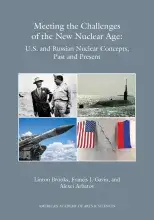
Meeting the Challenges of the New Nuclear Age: U.S. and Russian Nuclear Concepts, Past and Present, Linton Brooks, Alexei Arbatov, and Francis J. Gavin (American Academy of Arts and Sciences, 2018)
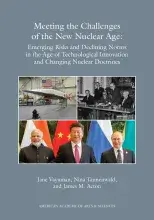
Meeting the Challenges of the New Nuclear Age: Emerging Risks and Declining Norms in the Age of Technological Innovation and Changing Nuclear Doctrines, Nina Tannenwald and James M. Acton, with an Introduction by Jane Vaynman (American Academy of Arts and Sciences, 2018)
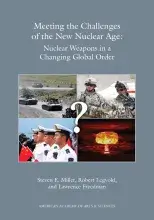
Meeting the Challenges of the New Nuclear Age: Nuclear Weapons in a Changing Global Order, Steven E. Miller, Robert Legvold, and Lawrence Freedman (American Academy of Arts and Sciences, 2019)
Contemplating Strategic Stability in a New Multipolar Nuclear World, Robert Legvold (American Academy of Arts and Sciences, 2019)

“Meeting the Challenges of a New Nuclear Age,” Dædalus, edited by Robert Legvold & Christopher Chyba (2020)
Project
Civil Wars, Violence, and International Responses
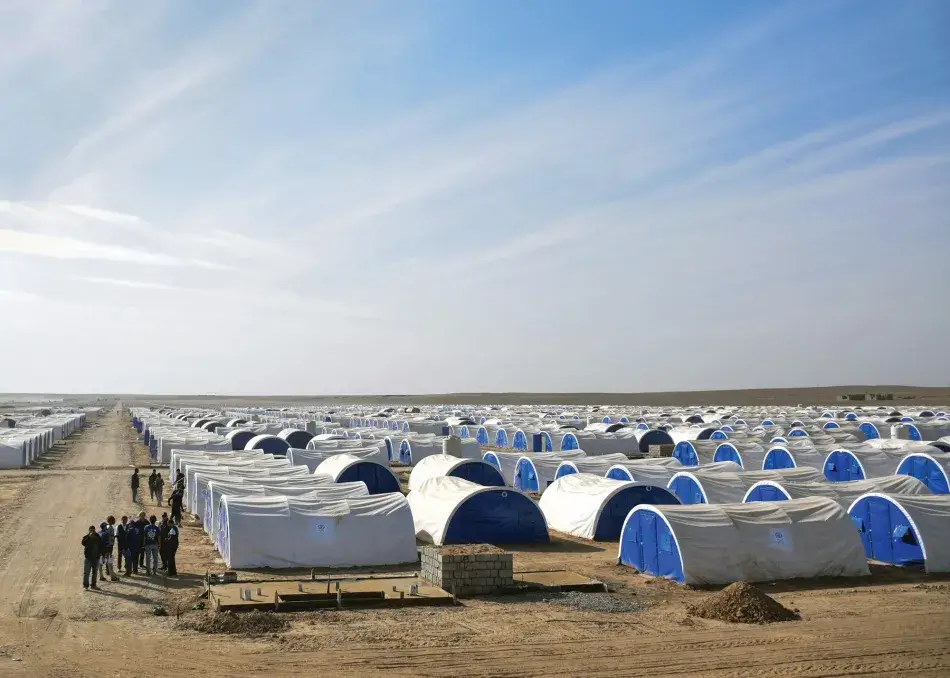
The Civil Wars, Violence, and International Responses project stems from the observation that current multilateral approaches for preventing, mitigating, and resolving civil wars and intrastate violence are often far too ambitious. They frequently overpromise stability, security, peace, democracy, and development to countries experiencing high levels of violence and instability. The project identified six threats that emerge from civil wars and intrastate violence: pandemic diseases, transnational terrorism, migration, regional instability, great power conflict, and criminality. Project participants engaged in extensive domestic and international outreach to share findings and recommendations that deliver a more comprehensive, effective, and integrated approach to conflict prevention and crisis management, which encompasses security, diplomacy, and development strategies in countries such as Colombia, Nigeria, Ethiopia, Syria, Lebanon, and Sri Lanka, among others. Building on these policy discussions, in January 2021 the project published a research paper that focuses on the policy implications of the project’s findings, which was distributed to relevant policy-makers in the United States and internationally. Outreach activities for the paper focused on connecting with members and staff of the U.S. Congress, with policy-makers in Europe, and with other relevant audiences.
PROJECT CHAIRS
Karl Eikenberry
Schwarzman College
Stephen Krasner
Stanford University
PROJECT MEMBERS
Michele Barry
Stanford University
Abdeta Dribssa Beyene
The Centre for Dialogue, Research and Cooperation, Ethiopia
Stephen D. Biddle
Council on Foreign Relations
Tanja M. Börzel
Freie Universität Berlin
Charles Call
American University
Susana Campbell
American University
Martha Crenshaw
Stanford University
Lyse Doucet
BBC News
Tanisha M. Fazal
University of Minnesota
James D. Fearon
Stanford University
Vanda Felbab-Brown
Brookings Institution
Francis Fukuyama
Stanford University
Sumit Ganguly
Indiana University
Miguel García-Sánchez
Universidad de los Andes, Colombia
Richard Gowan
New York University
Sonja Grimm
University of Konztanz, Germany
Jean-Marie Guéhenno
Centre for Humanitarian Dialogue, Switzerland
Joseph Hewitt
United States Institute of Peace
Stephen Heydemann
Smith College
Bruce Jones
Brookings Institution
Stathis N. Kalyvas
Yale University
Nancy E. Lindborg
The David and Lucile Packard Foundation
Sarah Kenyon Lischer
Wake Forest University
Clare Lockhart
Institute for State Effectiveness
Aila M. Matanock
University of California, Berkeley
Seyoum Mesfin †
Institute of Advanced Research, Ethiopia
Stewart Patrick
Council on Foreign Relations
Barry R. Posen
Massachusetts Institute of Technology
William Reno
Northwestern University
Thomas Risse
Freie Universität Berlin
Hendrik Spruyt
Northwestern University
Stephen Stedman
Stanford University
Eric Stollenwerk
Freie Universität Berlin
Paul H. Wise
Stanford University
PROJECT STAFF
Kathryn Moffat
Senior Program Officer
Tania Munz
Chief Program Officer
Islam Qasem
Program Director
Kathleen Torgesen
Program Coordinator
FUNDERS
Humanity United
Smith Richardson Foundation
Oak Foundation
† Deceased
Project Publications
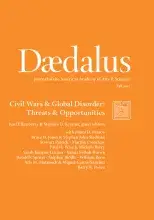
“Civil Wars & Global Disorder: Threats & Opportunities,” Dædalus, edited by Karl Eikenberry & Stephen D. Krasner (2017)
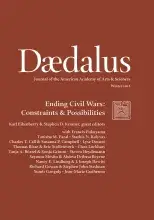
“Ending Civil Wars: Constrains & Possibilities,” Dædalus, edited by Karl Eikenberry and Stephen D. Krasner (2018)
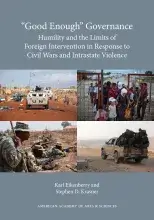
“Good Enough” Governance: Humility and the Limits of Foreign Intervention in Response to Civil Wars and Intrastate Violence, Karl Eikenberry and Stephen D. Krasner (American Academy of Arts and Sciences, 2021)
Project Meetings
Virtual Discussion about “Good Enough” Governance and Peacekeeping
July 15, 2021
The United Nations Department of Peace Operations and the Academy convened a webinar on the limits of international interventions in response to civil wars. The event built on four jointly organized workshops in 2017 that brought together scholars and UN practitioners. As part of the webinar, project chairs Stephen Krasner and Karl Eikenberry presented the key findings in their policy paper, “Good Enough” Governance: Humility and the Limits of Foreign Intervention in Response to Civil Wars and Intrastate Violence, followed by a series of responses from contributors to the project’s Dædalus volumes and a discussion with UN staff members from several UN agencies.
#BruteCast: Virtual Discussion about “Good Enough” Governance: Humility and the Limits of Foreign Intervention in Civil Wars and Weak States
July 29, 2021
The Academy and the Brute Krulak Center at Marine Corps University hosted a virtual discussion about the policy implications of the findings from the project. The event included presentations from select project contributors as well as from project chairs Karl Eikenberry and Stephen D. Krasner. The virtual session was webcast as part of the Brute Krulak Center’s #BruteCast YouTube series and podcast.
Exploratory Meeting
Checking Kleptocracy: Creating a New Instrument of World Order
On May 19–21, 2022, the Academy convened an exploratory meeting on the efficacy and potential establishment of an international anticorruption court. The meeting built on the Academy’s prior work on anticorruption, including a Dædalus volume on “Anticorruption: How to Beat Back Political & Corporate Graft” published in 2018. The exploratory meeting offered an opportunity to examine closely a proposal for an international anticorruption court, which was developed in an essay by Judge Mark Wolf for the Daedalus volume and has been used since to drive a wider series of discussions.
The participants in the meeting –diplomats, legal scholars, judges with experience in domestic and international courts, and individuals involved in the creation of other international courts –discussed issues central to the question of whether an international anticorruption court could help combat corruption in practice and how it could potentially be established. Among the themes discussed were the dangers and costs of grand corruption and how kleptocrats can best be pursued domestically and internationally; the core principles and mandate that would be needed by a potential new international court; and the strategies that could potentially lead to the establishment of the court.
CHAIR
Robert Rotberg
Harvard Kennedy School
PROJECT STAFF
Melissa Chan
Program Coordinator
Kathryn Moffat
Senior Program Officer
Tania Munz
Chief Program Officer
Islam Qasem
Program Director
FUNDER
American Academy Exploratory Fund